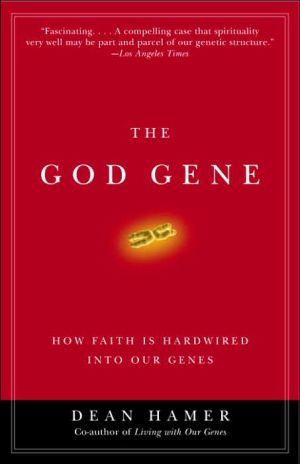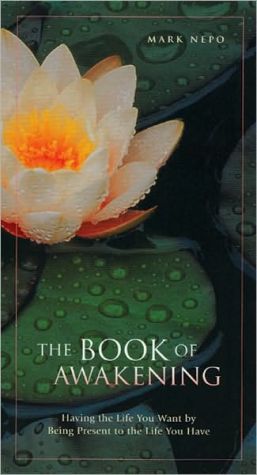God Gene: How Faith Is Hardwired into Our Genes
The overwhelming majority of Americans believe in God; this conviction has existed since the beginning of recorded time and is shared by billions around the world. In The God Gene, Dr. Dean Hamer reveals that this inclination towards religious faith is in good measure due to our genes and may even offer an evolutionary advantage by helping us get through difficulties, reducing stress, preventing disease, and extending life. Popular science at its best, The God Gene is an in-depth, fully...
Search in google:
The overwhelming majority of Americans believe in God; this conviction has existed since the beginning of recorded time and is shared by billions around the world. In The God Gene, Dr. Dean Hamer reveals that this inclination towards religious faith is in good measure due to our genes and may even offer an evolutionary advantage by helping us get through difficulties, reducing stress, preventing disease, and extending life. Popular science at its best, The God Gene is an in-depth, fully accessible inquiry into cutting-edge research that can change the way we see ourselves and the world around us. Written with balance, integrity, and admirable scientific objectivity, this is a book for readers of science and religion alike. Publishers Weekly This book's title is more rhetorical effect than factual accuracy: Hamer, who discovered the controversial "gay gene" in the 1990s, reports that he has now found a gene that may correlate in some people with their level of spirituality-not with belief in a being we would call God or with the performance of traditional religious practices, but with what psychiatrist Robert Cloninger called "self-transcendence." This trait is a capacity to feel at one with all life and with the universe as a whole, and Cloninger measured it with personality testing. The so-called "God gene" is a particular location in the human genome known as VMAT2, which affects the brain's neurotransmitters. Hamer admits that the gene probably accounts for less than 1% of the total variance in human spirituality. The book's later chapters become still more speculative, as Hamer, a molecular biologist at the National Cancer Institute, considers the scanty evidence of health benefits of spirituality, which would make faith an adaptive evolutionary trait. Hamer emphasizes that the existence of a "God gene" would neither prove nor disprove the reality of God. However, this gracefully written book may intrigue people of all faiths-or no faith-who wonder about the ultimate connection between science and religion. (On sale Sept. 14) Copyright 2004 Reed Business Information.
One\ Spiritual Instinct\ \ Instinct leads, logic does but follow.\ –William James\ The first thing I noticed about Tenkai was his smile. It was serene, content, knowing but not smug. It was the smile of a person at peace with himself and the world around him. The smile of someone who had seen much but could still be surprised. It was a spiritual smile.\ The second thing I noticed was that even though Tenkai spoke fluent Japanese, wore traditional Japanese garb, and was living in a Japanese monastery, he was clearly not Asian. His blue eyes and light brown hair were the giveaway. He, in fact, was born and raised in Hamburg, Germany, as Michael Hoffman.\ I met Tenkai at the Hosenji Zen Center, which is located in a small Japanese village about an hour’s train ride west of Kyoto. The Center provides a venue for people from different countries and religious traditions to learn about Zen Buddhism and practice its system of meditation, known as zazen, in which one sits in the lotus position with half-closed eyes and focuses on breathing. The idea is to empty the mind of all thoughts.\ I participated in the Center’s daily activities: waking to a gong at 6 a.m., an hour of zazen sitting in a traditional tatami mat room overlooking a waterfall, eating a breakfast of rice gruel and pickled vegetables in silence, several hours of weeding the vegetable garden or sweeping the stone paths, sutra chanting, supper of more rice and vegetables, and a final two hours of meditation in a log cabin overlooking a temple. It was a peaceful life. But I was not at the Center to ripen my intuitive faculties or to experiment with monastic existence. I was there attempting to understand whether or not there is a biological basis of spirituality.\ Until the age of twenty-four, Tenkai led an ordinary life as a high school teacher. Following a breakup with his girlfriend, however, he began to ask himself the life questions at the heart of our need to believe in something larger than ourselves. Why was he here? What is the purpose of life? Why is there so much suffering? Soon thereafter he quit his job, got on his bicycle, and started pedaling east. He didn’t stop until he reached the shores of the East China Sea.\ Along the way, Tenkai experimented with every spiritual system and mystical tradition he encountered. In Austria, he studied the principles of anthroposophy, which claims to be “a path of knowledge which leads the spiritual in the human being to the spiritual in the universe.” In an Indian ashram, he practiced a type of meditation in which bouts of exuberant dancing and singing were alternated with periods of complete motionlessness. He prayed for twelve hours a day at a monastery in Nepal, and in China he practiced the graceful motions of Tai Chi.\ At times he fasted and abstained from sex, while at other times he mixed alcohol, drugs, and women with abandon. There were times when he sat quietly for hours; at other times he jumped about and grunted like a gorilla. But no matter what he tried, no matter which spiritual leader he followed, Tenkai felt that something was missing. It wasn’t until he abandoned his bicycle and flew to Japan that he found what he was looking for: Zen Buddhism.\ Zen is based on the premise that every human being is capable of enlightenment. All that is needed is to see through to one’s true nature through meditation. The emphasis is on living in the present with no regret for the past or fear of the future. The motto on the Hosenji Zen Center’s brochure, for example, is “Your future is here now.”\ Zen is unique among religions in that it is virtually devoid of theology, scripture, or ritual. There are no gods or devils, there is no heaven or hell. Although Zen does have priests, they do not have any special claim to holiness.\ When I met Tenkai, he had just completed his apprenticeship at the traditional monastery of Empuku-ji and started residency at the Hosenji Center. The monastic life seemed to suit him well. Slowly, he told me, things began to change for him. It wasn’t so much that the monastic life changed the way he felt–he still had emotional ups and downs–or the way he thought. Zen isn’t about cognition, he explained. Instead it changed the way he perceived things. He felt he was more integrated with the universe, his sense of reality more focused. What changed, he says, was his sense of the way things are–his consciousness.\ Sometimes this new sensibility came upon him when he was practicing zazen. Other times it occurred when he was performing hard physical labor. Asked what it felt like, he told me, “I can’t explain it in words, but once you have the feeling you’ll understand. It’s like your mind just isn’t there.”\ When I admitted to Tenkai that I spent much of my meditation time fretting about routine matters, he gave me a spiritual smile. “It’s a strange and mystical thing, this feeling. But don’t worry,” he said. “Everybody gets it at one time or another.”\ A Human Universal\ \ Although Tenkai may be unusual compared to the average person in the strength and tenacity of his metaphysical yearnings, he is by no means unique. Most people, psychologists and theologians would argue, have some capacity for spirituality. It is among the most ubiquitous and powerful forces in human life. It has been evident throughout recorded history in every civilization and culture, in every nook and cranny of the globe. For many people, it is the main focus of their lives.\ Homo sapiens have had spiritual beliefs since the dawn of our species. More than 30,000 years ago, our ancestors in what today is Europe painted the walls of their caves with images of strange chimeras with human bodies and animal heads, representing, anthropologists feel, sorcerers or priests. These early humans buried their dead with elaborate preparations for the afterlife. Sometimes they equipped them with food and supplies for their journey; other times they cut off their hands and heads, perhaps to prevent the return of enemies. These are the actions of believers.\ Our spiritual convictions remain just as strong today. Surveys show that more than 95 percent of Americans believe in God, while 90 percent meditate or pray, 82 percent say that God performs miracles, and more than 70 percent believe in life after death.\ Our faith is not unique. Even in China and the former Soviet Union–where powerful governments used every possible form of persuasion to replace God with Communism–more than half of the people retained their spiritual beliefs. Meanwhile, the forces of fundamentalism–whether Christian, Jewish, or Muslim–are sweeping across the globe from South America to the Middle East to Africa.\ Our spiritual beliefs are not necessarily reflected in terms of church attendance, however. In fact, church attendance has been declining in the United States ever since the 1950s. More and more people feel that churches place too much emphasis on organization and not enough on spirituality. As noted in one Gallup poll, “believing is becoming increasingly divorced from belonging.”\ Church attendance in Europe has declined even more dramatically. In England and Holland, only 5 percent of the population attends religious services on a regular basis. Even in Italy, often considered a bastion of traditional Catholic values, the majority of people disagree with the Pope on religious issues such as divorce and abortion.\ The discrepancy between flagging attendance in formal religious settings and the high percentage of people who believe in God can be explained in large measure by the fact that spirituality is distinct from the precepts of any particular religion. More than three-quarters of people surveyed feel that God can reveal himself through many different paths. There is a growing sentiment that it doesn’t matter what church you go to because “one is as good as the other.”\ Despite formal religious adherence or attendance, a survey taken in the 1990s found that 53 percent of Americans have had a “moment of sudden religious awakening or insight.” In our own research at the National Institutes of Health, more than one-third of the essentially random collection of people we surveyed reported personal experiences in which they felt in contact with “a divine and wonderful spiritual power.” A similar percentage of people said that they have, at least once or twice, felt “very close to a powerful, spiritual force that seemed to lift you out of yourself.” Although such experiences were once regarded as signs of incipient psychopathology, recent research shows that they actually are associated with better adjustment and psychological health in most people.\ While someone like Tenkai may be at the high end of the human continuum in terms of his interest in spirituality, he is by no means unique. He stands out in the degree of his spirituality rather than in the fact that he believes in something larger than himself. He just has more than the usual degree of what in fact is a common human trait.\ \ The God Gene Theory\ Why is spirituality such a powerful and universal force? Why do so many people believe in things they cannot see, smell, taste, hear, or touch? Why do people from all walks of life, around the globe, regardless of their religious backgrounds or the particular god they worship, value spirituality as much as, or more than, pleasure, power, or wealth?\ I argue that the answer is, at least in part, hardwired into our genes. Spirituality is one of our basic human inheritances. It is, in fact, an instinct.\ At first, “instinct” may seem to be a peculiar word to pair with spirituality. We usually think of instincts as automatic, unconscious reactions or behaviors that are performed without thought or training. Birds know to fly south for the winter by instinct. Blinking your eyes when someone takes a swing at you is an instinct. A newborn baby learns to suckle at her mother’s breast by instinct, not because she has been taught. It is instinctual to become aroused when presented with a sexual stimulus. By contrast, spiritual behaviors such as meditating in the lotus position or taking communion are neither automatic nor unconscious. They are highly deliberate and culturally learned activities.\ I do not contend that spirituality is a simple instinct like blinking or nursing. But I do argue that it is a complex amalgamation in which certain genetically hardwired, biological patterns of response and states of consciousness are interwoven with social, cultural, and historical threads. It is this interdigitation of biology and experience that makes spirituality such a durable part of the fabric of life–a rich tapestry in which nature is the warp and nurture is the woof.\ The idea of complex characteristics that are influenced by both genes and environment is not unique to spirituality. There are many well-known examples of the interplay between nature and nurture, even among animals. Consider the song of the white-crowned sparrow. The male sparrow’s song, which he begins to sing at about seven or eight months of age, consists of a long, low whistle followed by a series of trills. That the song is at least partly innate can be seen by its species specificity: All male white-crowned sparrows sing basically the same song, even when they are separated from their parents after two weeks and raised in complete isolation from any other birds. Moreover, there is a dedicated brain circuit for song, consisting of six interconnected brain regions that control the vibrations of the vocal membranes in the throat. (Three of the regions are sensitive to sex hormones, which explains why only males produce the characteristic mating song.) The reason a sparrow sings the song of a sparrow, and not of a robin or a lark, is that it has the genes and brain of a sparrow, not that it was raised by sparrows.\ But experiments show that the song is also partly learned. Sparrows from different areas sing slightly different varieties of the song, or “dialects,” that differ in the exact number and placement of the trill notes. When sparrows are left with their parents for the first three months of life, then raised in isolation or with foster parents from another region, they still sing the parental dialect when they begin to vocalize a few months later. By contrast, when the young birds are taken from the nest after only a few weeks, then raised hearing tape recordings of a different dialect, they sing the foreign song.\ An even more profound effect of the environment has been shown in studies in which the chicks have been deafened at an early age. These poor animals never produce anything more than a few unconnected notes, no matter how hard they try. They need to hear themselves to sing properly.\ Such experiments show that while the basic species-specific skeleton of the song is hardwired in the genes, it requires the environmental clue of being able to hear its own voice to be triggered. And while the precise details of the song are culturally transmitted during a critical period early in life, they require the right biological machinery and genetic code to be actualized. It’s part of the remarkable yin and yang of nature and nurture, especially in a species that most people would never even associate with having a culture.\ In The God Gene, I propose that spirituality has a biological mechanism akin to birdsong, albeit a far more complex and nuanced one: that we have a genetic predisposition for spiritual belief that is expressed in response to, and shaped by, personal experience and the cultural environment. These genes, I argue, act by influencing the brain’s capability for various types and forms of consciousness, which become the basis for spiritual experiences.\ The term “God gene” is, in fact, a gross oversimplification of the theory. There are probably many different genes involved, rather than just one. And environmental influences are just as important as genetics. Finally, spirituality, in its broader meaning, is about much more than belief in a particular God. Some of the most spiritual people I’ve interviewed and discuss, such as Tenkai, don’t believe in a deity at all. Nevertheless, I felt it was a useful abbreviation of the overall concept.
1Spiritual instinct12Self-transcendence173An inherited predisposition394The God gene565Monoamines and mysticism796The way things seem907How the brain sees God1198Evolving faith1409Religion : from genes to memes16110The DNA of the Jews18011God is alive197
\ From Barnes & NobleScientist Dean H. Hamer asserts that there is a biological basis for belief in God. Rather than affirming or denying God's existence, Dr. Hamer discusses the new discoveries in behavioral genetics and neurobiology that support the idea of a predisposition for faith. In his laboratory at the National Institutes of Health, he and his colleagues have analyzed over 1,000 people, comparing their DNA samples against a scale that measures spirituality. As a result of their work, Hamer believes that he can identify a specific faith-fostering gene.\ \ \ \ \ Publishers WeeklyThis book's title is more rhetorical effect than factual accuracy: Hamer, who discovered the controversial "gay gene" in the 1990s, reports that he has now found a gene that may correlate in some people with their level of spirituality-not with belief in a being we would call God or with the performance of traditional religious practices, but with what psychiatrist Robert Cloninger called "self-transcendence." This trait is a capacity to feel at one with all life and with the universe as a whole, and Cloninger measured it with personality testing. The so-called "God gene" is a particular location in the human genome known as VMAT2, which affects the brain's neurotransmitters. Hamer admits that the gene probably accounts for less than 1% of the total variance in human spirituality. The book's later chapters become still more speculative, as Hamer, a molecular biologist at the National Cancer Institute, considers the scanty evidence of health benefits of spirituality, which would make faith an adaptive evolutionary trait. Hamer emphasizes that the existence of a "God gene" would neither prove nor disprove the reality of God. However, this gracefully written book may intrigue people of all faiths-or no faith-who wonder about the ultimate connection between science and religion. (On sale Sept. 14) Copyright 2004 Reed Business Information.\ \ \ Library JournalThe chief of Gene Structure at the Cancer Institute argues that spiritual belief has an evolutionary advantage. Copyright 2003 Cahners Business Information.\ \ \ \ \ Kirkus ReviewsAre we instinctively spiritual beings? Molecular geneticist Hamer (Living with Our Genes, 1998, etc.) ponders the question in an intriguing and demanding study. The author makes it clear that this will not be an enwrapping explanation of spirituality, and that a consideration of the truth of beliefs must await future savants. Hamer is talking about spirituality, per se, as distinct from the precepts and organization of any particular religion. He suggests that spirituality is "a complex amalgamation in which certain genetically hardwired, biological patterns of response and states of consciousness are interwoven with social, cultural, and historical threads." This mix links objects and experiences with emotions and values; it provides a sense of faith, enlightenment, and self-transcendence. Hamer brings factor analysis and statistical relevance into play; by analyzing and comparing the DNA structures in spiritual people, he argues, "we can identify any sequence variations that track along with the strength of their beliefs." He discerns a critical role for the VMAT2 gene with a variant containing a C, or "spiritual allele." This is vital stuff, especially as it pertains to consciousness, and monoamines appear intricately involved. But although Hamer aspires to a popular audience, he often loses the non-molecular biologist with sentences like: "One cluster of neurons is based in the ventral tegmental area and sends its axons mostly to the forebrain, prefrontal cortex, amygdala, and a special area called the nucleus acumbens." At certain critical instances he confuses lay readers, as when he notes that serotonin "elevates mood, an aspect of the perception of sacredness," then refers to itas "the brain's 'feel bad' chemical." Nonetheless, feelings, Hamer emphasizes, are instrumental to spirituality-and who would deny that monoamines might play the crucial part?Notes toward an understanding of human spirituality: vigorous, fascinating, and open to interpretation, not least by Hamer himself. Agent: Julie Castiglia/Castiglia Literary Agency\ \








